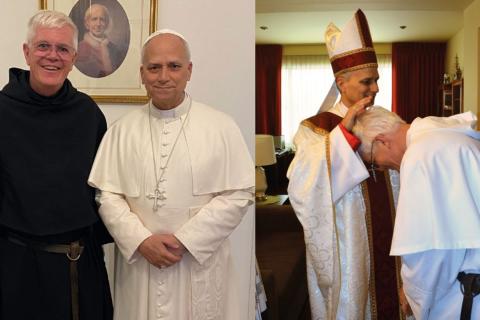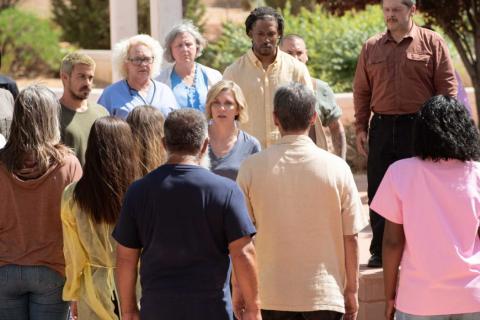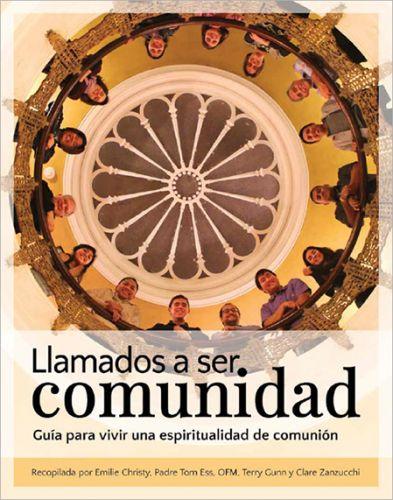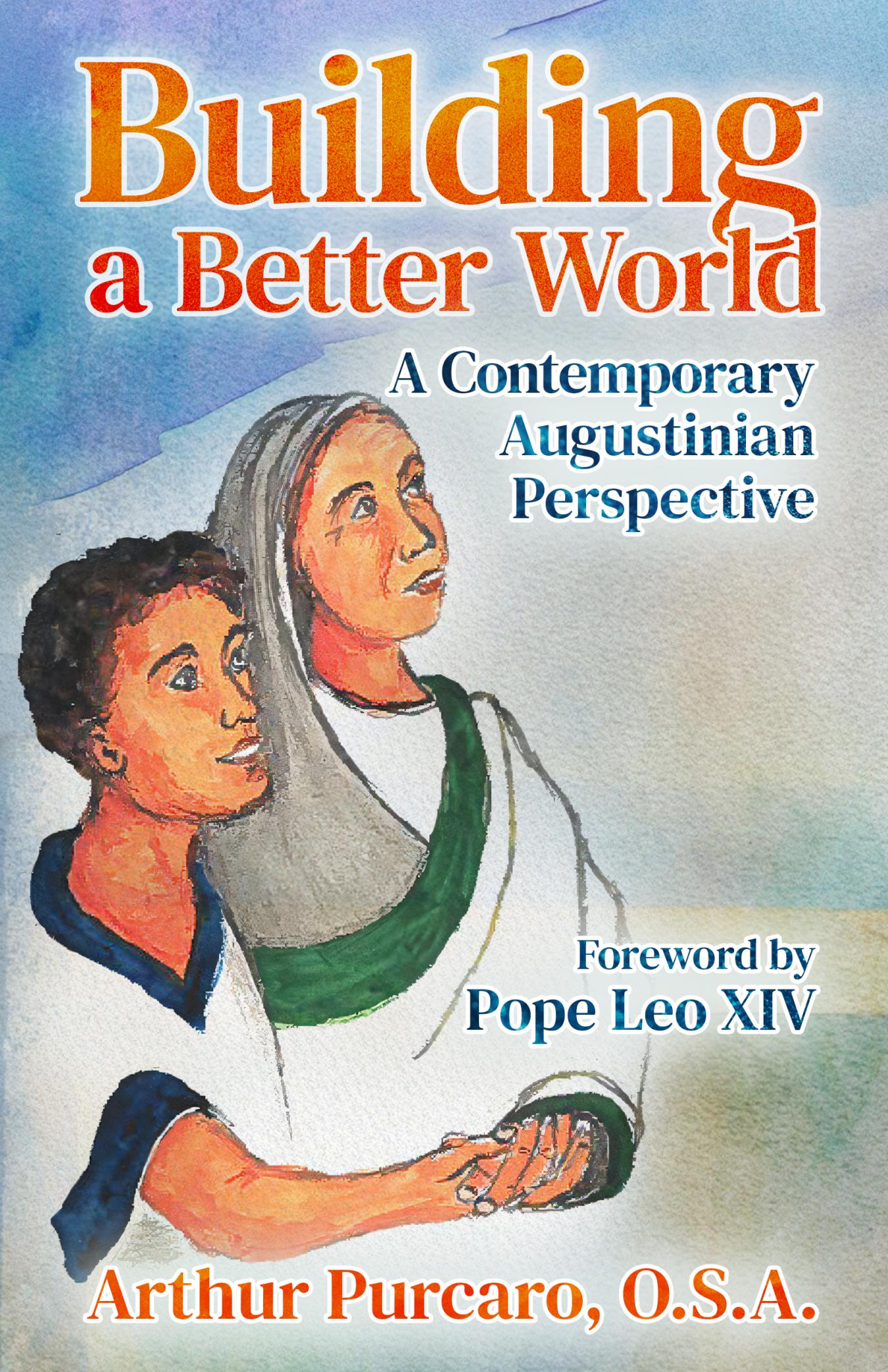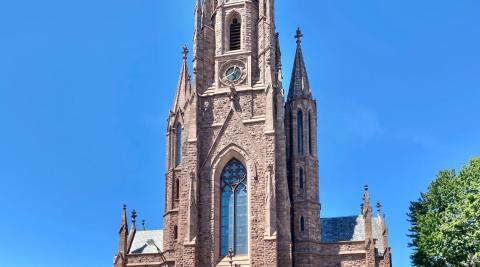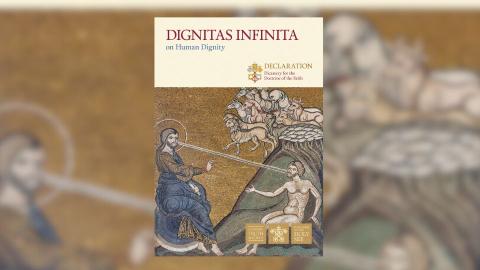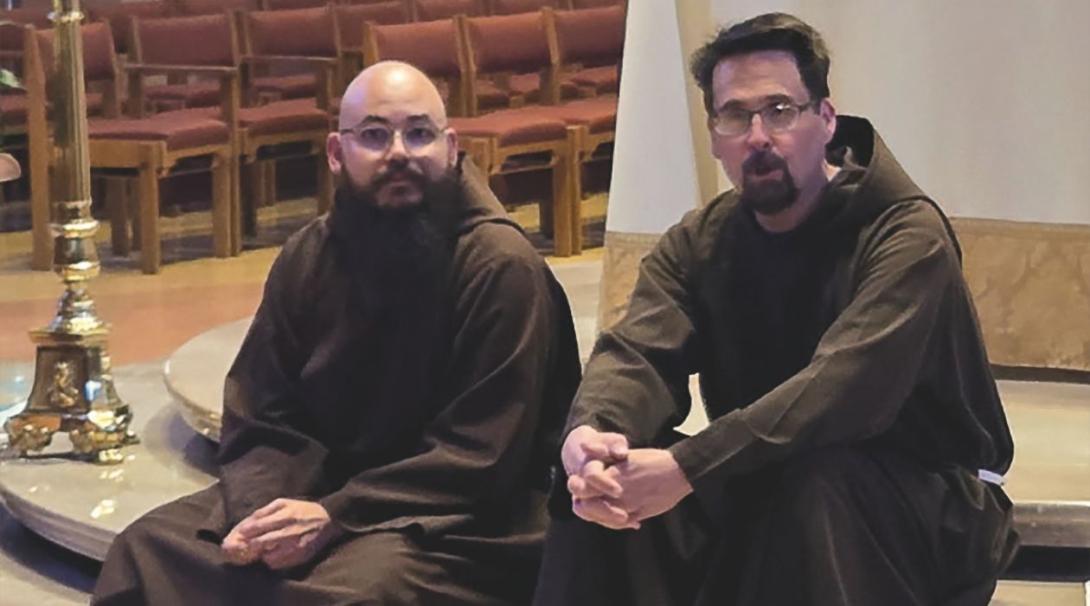
Brother Carlos-Andres and Jon M. Sweeney after their performance, Cathedral of St. John the Evangelist, Milwaukee, Wisconsin, May 10, 2025.
Getting to portray Saint Francis in a play was not something I was expecting to do when I first began Postulancy. The idea came up last year in September when my formator, Br. Lake, asked us postulants if any of us would be interested in portraying St. Francis in a play composed by Jon Sweeney, a play meant to commemorate the 800th anniversary of the composition of the “Canticle of the Creatures.” Not a moment after this was said and one of my peers voluntold me by saying “Carlos should do it!” I didn’t resist it, actually, because I was already thinking about signing up for it. The thought had already crossed my mind—I’ve never acted in a play before, but I’m a musician and I’m used to being in a performance setting. It shouldn’t be too difficult. It’ll be something new. Michael’s comment just validated my thought process.
Then began a process meeting, getting an idea of the vision for this play, receiving the script and brainstorming. One particular idea that was present shortly after reading the script was to set the Canticle verses in the play to music. Jon mentioned the idea of adapting the lyrics to already existing melodies, but I wanted to take things a step further in terms of immersion: Why not listen to medieval folk music from France and Italy that would have been commonly heard in the 1200s, and then compose a melody based on that? Francis likely would have been inspired by some melodies he heard or sang as a performer, I thought, so why not dive into this? To our knowledge, the original melody has been lost to time, so this could be a good opportunity to reflect something that may be true to what the original Canticle may have sounded like.
You can do that?
I mean, I’ll give it a try.
And so, I began composing a melody based on the tonalities and rhythms I heard when searching for French and Italian medieval folk music. I like to joke that this process effectively made this play into a musical, but I digress. The process itself was one that demanded flexibility as the script was often adapted after receiving feedback to reflect simpler language, and composing a melody in the face of lyrical changes can be a bit tricky. Nonetheless, it was a process I enjoyed, and by the end of October I had a comfortable draft for the melody that would be performed for the play.
All of this paved the way for the eventual learning, rehearsing, and integration of the play itself. See, composing and memorizing music was a familiar process to me. Learning a script for a play was not. While the two might be similar, when it came to learning the lines of the play, I did not have the comfort of a melody to lean on. It’s much easier to sing your ABCs than to recite them. It was an initially clunky process as I practiced with one of my postulant brothers, Dave, multiple times a week starting in February. At one point I felt I hit a performance block—I was memorizing the lines of the play but it did not have that je ne sais quoi that it needed to really bring it to life. I was stumped.
I needed to invite St. Francis into this process. I needed to pray through this play.
What did I need to do to make this play come to life?
I needed to invite St. Francis into this process. I needed to pray through this play. I needed to enter into a saint’s most expressive heart and integrate his affective demeanor into the words and that we were attempting to commemorate. I needed to remember that the “Canticle of the Creatures” is, first and foremost, a prayer of praise and thanksgiving to our Beloved Creator and Father in Heaven. It was not until I made this interior shift from preparing to perform this play to preparing to pray through this Canticle that the play itself began to receive the life-giving breath it so desperately needed. It was not until this happened that I began to feel more comfortable in my rehearsing, singing, and recitation, to the point that I began to incorporate choreography to portray elements such as Brother Sun, Sister Water, Forgiveness and Mercy, and Sister Death. I was no longer performing the composition of the Canticle, I was now experiencing it because I was praying through this process.
Prayer is at the heart of what it means to be a Franciscan (especially a Capuchin Franciscan). It is that intimate, personal relationship with Christ that drives me to love those around me, those whom I live with in fraternity, and through loving those the Lord has given me I can then share the Merciful Love of Christ to those whom I minister in the world. It was this very process that moved St. Francis to see himself as a Beloved Son of the Father, this very process that allowed him to see Christ in the Leper, and this very process that inspired so many others to follow his path: the simple (yet demanding) path of living out the Gospel. It is all of this that gave St. Francis the joyful ardor he needed to sing the praises in the Canticle. It is all of this that invited me to join our brother in the preparation for this play.
Creation gives glory to God, and this creation is made specifically for you.
By approaching this prayerfully I learned much about myself, especially through finding my life intertwined with that of Christ and of St. Francis. There were two verses in particular that spoke to some experiences I lived out at various points throughout my year as a postulant: the cauterization of St. Francis through Brother Fire, and the Merciful Love present in those who show forgiveness. Experiences of shortcomings can sometimes feel as painful as being burned by fire, but remembering my identity as a Beloved Son and his Inexhaustible Mercy has given me the grace to be still, and to know that nothing, absolutely nothing, can ever remove my identity that is being a Beloved Son of the Father, an identity that both Christ and St. Francis modeled for the Church and the world.
To be able to integrate this meditation into the performance of the play opened the door to further integrate the remaining verses of the Canticle into my person, and to express this joyfully and playfully in a way that was simple yet profoundly imaginative. It allowed me to remember simple days of splashing in water like a child, running and twirling to feel the wind, and to even solemnly remember death as I recalled the years I worked as a board-certified music therapist in end-of-life services. The “Canticle of the Creatures” truly encompasses all points of life, with its simplicity and complexities, in a way that is deeply prayerful, wonderfully melodic, and profoundly loving.
When I first signed up to portray St. Francis, I never would have imagined that I would have gained so much from this process of performing a play. And yet, what an absolute grace that through this performing art the Lord granted me the opportunity to enter into his most Sacred Heart, to enter the heart of St. Francis, and to enter into my own heart, all as a means to further see myself as a Beloved Son and to give glory to God in the Highest. If nothing else, the “Canticle of the Creatures” truly communicates just that: creation gives glory to God, and this creation is a creation he has made specifically for you, you who are his most Dearly Beloved Child.





